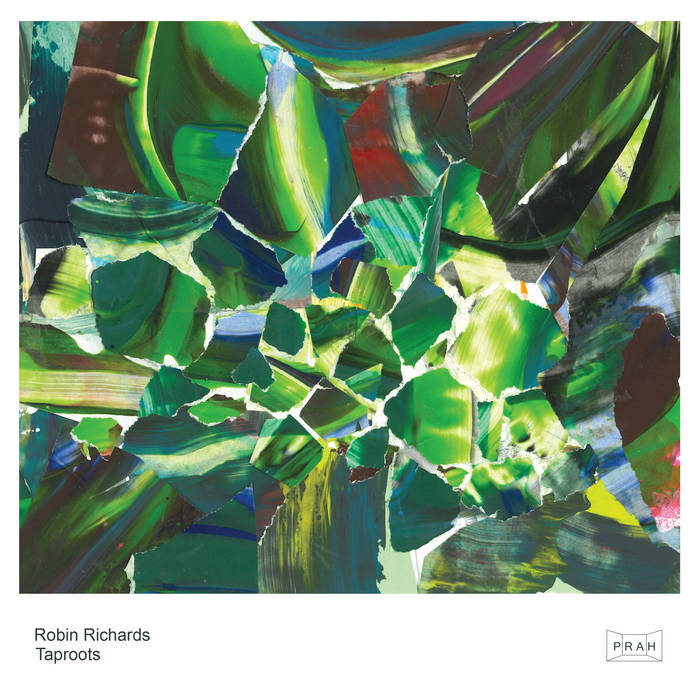There are artists who treat solo albums as side notes, and there are those who seize the chance to excavate new terrain. With Taproots, Robin Richards, principal composer of Manchester’s idiosyncratic art-pop band Dutch Uncles, delivers a record that feels less like a digression and more like a statement of intent. If Dutch Uncles built their reputation on angular pop exuberance, Richards’ debut long-player re-roots him in a more contemplative, exploratory soil: part electronic meditation, part modern classical suite, part intimate diary.
Richards is no stranger to ambitious projects. With Dutch Uncles, he helped shape six albums that earned comparisons to Talking Heads for their wiry rhythms and brainy exuberance. In 2021 he released a double soundtrack (The Earth Asleep and Birdsong, via PRAH Recordings), which revealed his aptitude for narrative and mood. Yet Taproots feels different, a deliberately personal album that pushes into the overlapping spaces of experimental electronics, contemporary composition, and concept-driven narrative. It sits comfortably alongside Oneohtrix Point Never, Flying Lotus, Hinako Omori, and Djrum, but with a Mancunian sensibility that sets it apart.
At its heart, Taproots is an album about cycles: of self-doubt and renewal, of fatherhood and adaptation, of nature’s patterns mirrored in human growth. Richards frames much of the record around the life cycle of trees, germination, blossoming, decay, regeneration, and you can hear that metaphor woven into the arc of the music.
The opening piece, ‘Carnation’, establishes the tone: a fluted, melancholic meditation that seems to draw breath from the natural world itself. The instrumentation is airy but purposeful, as if sketching light through branches. It sets the listener firmly in Richards’ sonic space, reflective, rooted in organic creativity but stretched through electronic treatment.
From there, the album branches in multiple directions. ‘Conducti’ and ‘Gossamer’ introduce buoyant, swelling pop elements, echoes of his Dutch Uncles past refracted through a more restrained palette. There is lift and playfulness here, but also restraint, the sense of energy contained, directed, reshaped. ‘Ossai’, by contrast, is hushed and calming, built around piano and light percussion, a moment of stillness that feels like pausing in the shade of an ancient tree.
The title track, ‘Taproots’, is darker: melancholic, brooding, and somewhat restless, as though reaching down into uncertain soil. Its mood pivots sharply into ‘Epoxy’, a piece already released with an accompanying video featuring London dance duo Ekleido. Here Richards embraces electronic propulsion: rhythms snap and shift, synths drive forward, and the music feels more like a dancefloor experiment than a chamber meditation. This abrupt turn is deliberate, a reminder that the album is not only about quiet contemplation but about growth under pressure, adaptation, even rupture.
One of the record’s most striking moments is ‘Bole’, which emerges with immense, futuristic synthesizer swells, a track that feels less botanical and more cosmic, as though nature’s cycles are being reimagined in circuitry. It’s disorienting but thrilling, the kind of electronic maximalism that nods toward Flying Lotus or even the futurist edges of 80s synth pioneers.
‘Flawwws’, Richards has said, was born from his anxieties about social media addiction and its corrosive effect on creativity. The composition mirrors that experience: built on a modulating chord sequence that denies resolution, it unsettles the listener just as digital distraction unsettles the artist. Richards himself described the track as intentionally uncomfortable, the harmonies shifting just when they appear to settle, intensity compounding until the close. It’s one of the most conceptually tight moments on the record, translating personal crisis into compositional form.
The back stretch of the album leans cinematic. ‘Canopy Shy’ feels like a film score, futuristic but spacious, balancing electronic textures with a kind of observational detachment. ‘Spiral’ is built around striking, cascading piano figures, alternating between delicacy and insistence, a piece that simultaneously calms and unsettles, mirroring the cycle implied by its title. Finally, ‘Seeds’ closes the record on an uplifting, experimental note: cinematic and expansive, as though the album’s motifs are sprouting anew, pointing outward rather than inward.
Part of Taproots’ power lies in its collaborators. Pianist Chris Illingworth of Mercury Prize-nominated GoGo Penguin contributes to several tracks, his playing adding both clarity and turbulence. Flautist Ellen Beth Abdi, an emerging Manchester solo artist, lends breath and colour to pieces like ‘Carnation’, underscoring the album’s organic metaphors. Producer Brendan Williams (whose credits span James, Wu Lyf, GoGo Penguin, and Dutch Uncles) gives the record both polish and edge, ensuring its eclectic palette remains cohesive.
The instrumentation itself deserves close attention. Richards experiments with prepared pianos, treated guitars, and manipulated acoustic sounds, which he then layers with an orchestra of synthesizers, flutes, and samples. Live drums underpin the arrangements, while Richards’ distinctive bass guitar often anchors the compositions with subtle authority. The result is a sound world that is at once tactile and digital, organic and synthetic, a balance perfectly suited to the album’s theme of growth through adaptation.
If Richards’ band catalogue was defined by angular pop smarts, Taproots is looser, more exploratory, but no less rigorous. It carries the emotional candour of a debut solo statement while drawing on his years of compositional discipline. At times, the record evokes the immersive headphone worlds of Oneohtrix Point Never; at others, it recalls the layered rhythmic play of GoGo Penguin, or the cinematic arcs of contemporary soundtrack work. Yet Richards’ voice is distinct, rooted in the idiosyncrasies of his melodic instincts and his conceptual framing.
The title itself, Taproots, is telling. In botany, taproots are the anchoring structures that reach downward, drawing nutrients while holding the plant in place. For Richards, this album seems to serve a similar purpose: a rooting down into personal doubts and joys, into cycles of nature and cycles of thought, in order to emerge with something sturdy and nourishing.
As a debut solo long-player, it is impressive not only in scope but in execution. The thematic arc is coherent without being heavy-handed; the individual pieces stand alone yet reward immersion as a suite. Richards has managed to make an album that feels conceptual without being clinical, experimental without losing accessibility, personal without lapsing into self-indulgence.
In the end, Taproots is about growth, tentative, uneven, sometimes painful, but ultimately important. It’s a reminder that experimentation is a continuation, a way of finding new shoots from old roots. For an artist already established in one of Manchester’s distinctive bands, this record signals a branching: a chance to see what grows when the soil is turned and the roots are tested.



